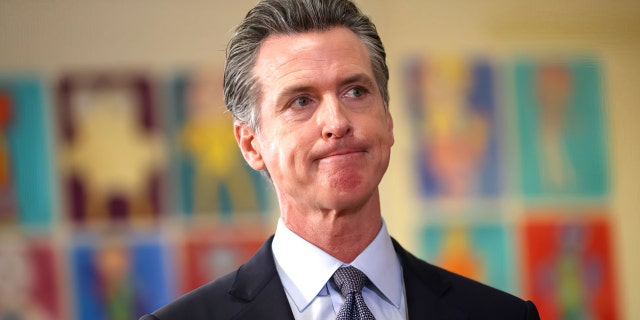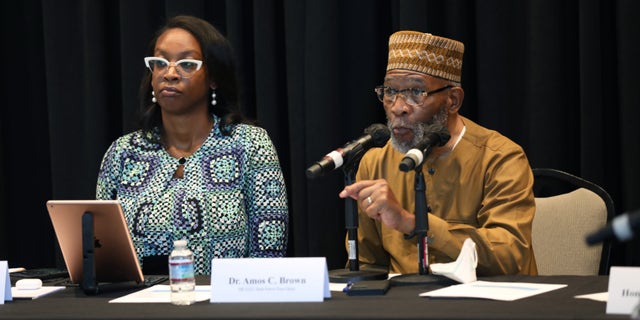“We want to make sure that this is presented out in a way that does not reinforce the preoccupation with a dollar figure, which is the least important piece of this,” Cheryl Grills, a clinical psychologist and member of the California Reparations Task Force, told CalMatters in a new interview.
“It’s important,” continued Grills, “but it’s the least important in terms of being able to get to a point in our country’s history and in California’s history where we recognize that the harm cuts across multiple areas and domains and that the repair needs to align with that.”
Cheryl Grills, right, and Lisa Holder, left, both members of the California Reparations Task Force (Screenshot from Twitter account od )
Last month, economists predicted in a preliminary estimate that California’s reparations plan could cost the state over $800 billion. The task force, which consulted five economists and policy experts to arrive at the number, clarified that the total does not include compensations for property the group says was taken unjustly, or for the devaluation of Black-owned businesses. California’s total annual budget currently sits at roughly $300 billion.
The task force had previously been considering a proposal to give just under $360,000 per person to approximately 1.8 million Black Californians who had an ancestor enslaved in the U.S., putting the total cost of the program at about $640 billion.
It’s unclear how California would pay for large-scale reparations. Newsom announced in January that the state faces a projected budget deficit of $22.5 billion for the coming fiscal year. Then weeks later, the California Legislative Analyst’s Office, a government agency that analyzes the budget for the state legislature, estimated in a subsequent report that Newsom’s forecast undershot the mark by about $7 billion.
Still, Grills chided the media for covering California’s reparations proposals by focusing on the dollar amount.

California Gov. Gavin Newsom speaks during a press conference in San Francisco, California. (Justin Sullivan/Getty Images)
“It’s really unfortunate. I’m actually sad to see that our news media is not able to nuance better,” she said. “It’s almost like, ‘What’s going to be sensational’ as opposed to what’s important.”
A final report with the panel’s official recommendations is due by July 1 to the California Legislature, which will then decide whether to implement the measures and send them to Gov. Gavin Newsom’s desk to be signed into law.
Newsom, a Democrat, signed a bill creating the task force amid the unrest following the 2020 murder of George Floyd in Minneapolis. He appointed the majority of the panel’s nine members, one of whom are White.
Another task force member, Lisa Holder, president of the far-left Equal Justice Society, vowed in a recent opinion piece that the committee’s “recommendations will be breathtaking.”
According to California Justice Department officials, the law creating the task force did not instruct the committee to identify funding sources.

California Gov. Gavin Newsom speaks during a news conference after meeting with students at James Denman Middle School on Oct. 1, 2021 in San Francisco, Calif. (Justin Sullivan/Getty Images)
“The task force is required by AB 3121 to recommend to the legislature methods for calculating reparations and the scope of reparations,” Senior Assistant Attorney General Michael Newman previously told CalMatters. “Based on their recommendations, the legislature is ultimately tasked with implementing these changes into law and figuring out how to pay for it.”
More recently, the panel’s chair, Kamilah Moore, said last month it’s up to the state legislature to determine a restitution amount based on the methodology economists recommended.
“The task force is pretty much done regarding the compensation component,” she told KCRA. “Our task was to create a methodology for calculation for various forms of compensation that correspond with our findings.”

Kamilah Moore, chair of the California Reparations Task Force, left, and Amos Brown right, vice chair, at the California Science Center in Los Angeles on Sept. 22, 2022. ((Carolyn Cole / Los Angeles Times via Getty Images))
At a recent in-person meeting of the task force, activists demanded California pay millions of dollars per Black resident in reparations, dismissing the idea of payments of $5 million per person as “nothing” and “too little.”
The $5 million figure appeared to come from the city of San Francisco, which is currently weighing its own reparations proposals at the local level to pay that amount to qualifying Black residents.
Beyond the money, proponents of reparations are also seeking a range of other measures, including an apology letter from the state of California for past discrimination.
It “doesn’t cost a dime,” he said. “I think that one is as important as the others.”
California, which never allowed slavery, entered the union in 1850 as a free state.
Source: Fox News



